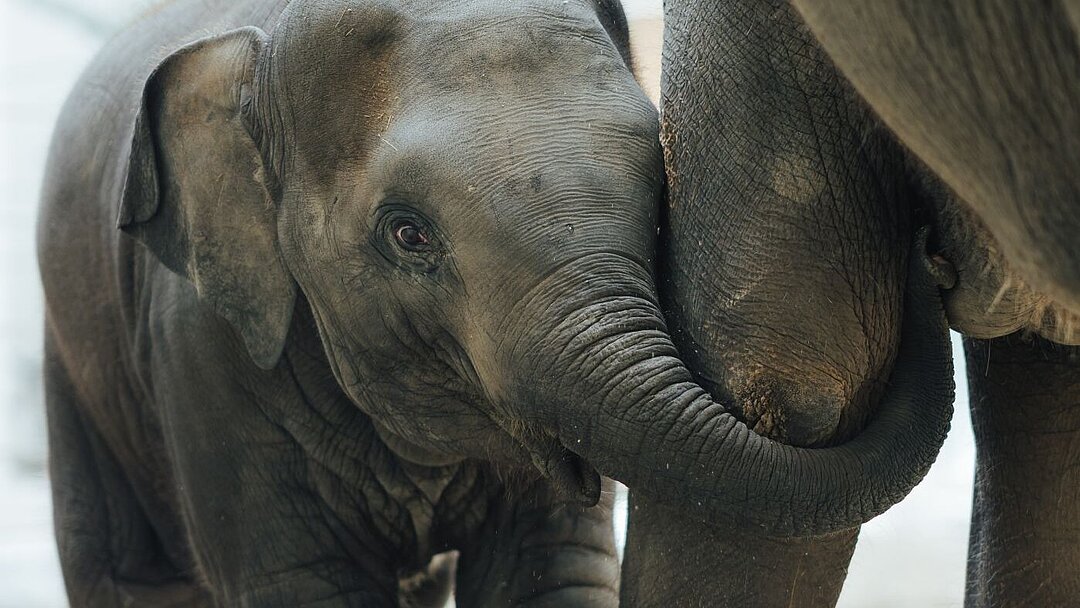
With the arrival of the two female elephants Rani and Savani from Leipzig Zoo in late May, followed by the unexpected death of the juvenile male Otto from a herpes virus a few weeks later, the elephant group at Hellabrunn Zoo is currently undergoing a process of social structure reorganisation. Not only do Rani and Savani have to find their place within the group – the long-standing residents Mangala, Temi, and Gajendra also have to redefine their roles within the herd.
When Rani and Savani arrived at Hellabrunn at the end of May, the first few weeks of settling in went surprisingly smoothly. This was due in part to the fact that young Otto – after initial hesitancy – became an important link between Rani, Savani, Temi, and Mangala. Team leader Daniel Materna said: "The arrival of the two new elephants saw Otto develop significantly and become a bit more independent. He united the herd through his character and social skills. At the same time, the two youngsters brought mums Temi and Rani closer together as they looked after their offspring."
After Otto's sudden death, a noticeable gap emerged in the elephant herd at the zoo. "This means that Temi now has to find a new position or fill a vacant role. It also creates some form of competition with Rani. This is entirely natural – we mustn't forget that Temi's hormonal balance is currently undergoing extreme changes," added Materna. As is typical in any elephant herd, the elephants at Hellabrunn Zoo usually live in a fixed social structure. The roles of the female pachyderms at the zoo are currently being redefined due to the events of the last few weeks.
Attentive visitors have observed that in recent days the situation in the Elephant House is not always harmonious. At times, conflicts between the elephant residents can seem very heated – but this is a natural part of the species’ social dynamics. "Rani is a challenging elephant with a somewhat difficult past. In Leipzig, she was not integrated into the herd – and with us, too, she sometimes shows that she doesn't quite know how to behave around other elephants," said Materna. In contrast, her interactions with the keepers are less complicated.
After the past few eventful weeks, the elephants in Munich will now have to establish their social order. Elephants are very sensitive animals – this is especially noticeable when changes occur, and each animal reacts differently. The settling in process for elephants can take weeks, months, or even years – it requires a lot of work, patience, and instinct.
The animal care team, comprising the curator, keepers and veterinarians, have taken steps to ensure that Rani has places to retreat and sufficient food available – but at the same time, she should not lose contact with the herd. "With Rani, it is extremely important that she does not withdraw too much," said Materna.
Savani, her daughter, plays an important role in this transitional phase – she acts as a bridge between Rani and Temi and Mangala, thus making a significant contribution to the social stabilisation of the group.
Hellabrunn Zoo will continue to closely monitor the development of the elephant group and support the animals during this sensitive phase with great care and professional expertise. The goal is to promote a stable and harmonious herd structure in the long term. The zoo will provide regular updates on the group‘s progress.
![[Translate to English:] Copyright: Jan Saurer Elephant cow Rani with her daughter Savani in the Hellabrunn Elephant House](/fileadmin/_processed_/a/9/csm_2025-07-24-Asiatischer-Elefant-Jan-Saurer-im-Haus_040e830f1c.jpg)